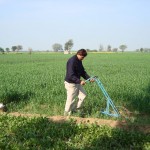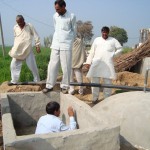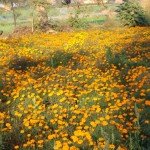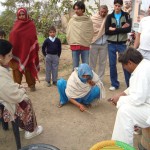DST Project 2008-2011
- Farming Equipment at Khurrampur
- Bio Gas Plant under construction at Tripari
- High Variety, high yield Marigold blooms at Tirpari.
- Vermicompost Training
AIWEFA gained a great deal of insight into the lives and ways of work in the rural areas and was dismayed at the lack of exposure of the farmers and their inadequate awareness of developments in agriculture and the demands of the market leave alone their health and nutrition status and their drudgery. Encouraged by the response to new technologies and diversification of crops introduced under the FAO Project in two villages of Daboda and Tirpari, and the leadership of women farmers, AIWEFA requested the assistance of the Department of Science and Technology to start an Agricultural Resource Centre with a Demonstration unit(s) and drudgery reduction methods in farm work, more particularly for women. In 2008, the DST sanctioned a Project for three years in five villages in this area, with a special study of a hundred women to observe the impact of the changes introduced in the process.
- Soil studies and soil improvement; Use of improved seeds;
-
Introduction of new varieties and species of crops/plants
-
Bio-gas production; Vermiculture; Better Animal Husbandry practices;
-
Green-Houses/Net-Houses;
-
Improved/appropriate tools for removing or decreasing drudgery;
-
Better agricultural practices; Market Intelligence; New off-farm activities;
-
Bee Keeping; Post Harvest Practices;
-
Better understanding of nutritional values of food and incorporation in their diets (like inclusion of vegetables);
-
Organisation of farmers into Self Help Groups of both men and women for
their mutual benefit; -
Exposure visits; Exposure to Experts: Training as necessary;
-
Supply of inputs to introduce new items relevant to increased productivity;
-
Water management including water harvesting, sprinklers, and other
water conservation methods; -
Any other items arising in the course of project implementation.
The project was implemented in Daboda, Basunda, Tirpari, Khera and Khurrampur villages. Five Vermiculture plants were been initiated, growing of vegetables, new rice varieties have started. Control of diseases in wheat and mustard was been introduced. Crop husbandry was been improved. Farmers visited the IARI Krishi Mela and were exposed to a great deal of information on improving their practices, new variety of crops, Post Harvest Practices and use of new tools. There was a lot of interest in the men and women farmers to adopt new technologies and improve their production and incomes




